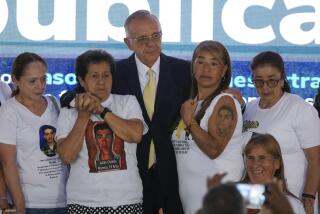Two Argentine ex-generals guilty in ‘dirty war’ death
- Share via
BUENOS AIRES — A pair of octogenarian ex-generals who served during Argentina’s “dirty war” against internal dissent were sentenced to life in prison Thursday after defiantly declaring they were innocent of the murder charges on which they were convicted.
“I am being pursued politically by those defeated in yesterday’s war,” white-haired ex-Gen. Antonio Domingo Bussi, 82, testified before being sentenced in the northern province of Tucuman.
Also sentenced by the same three-judge panel was Bussi’s former boss, former Gen. Luciano Benjamin Menendez, 81, who testified that he had done what was necessary to confront “international communism.”
Human rights advocates called for the pair to be sent to prison, but Bussi was immediately returned to house arrest at his residence in an exclusive gated community. Menendez was dispatched to military custody.
The pair were convicted of murder and related charges in connection with the disappearance of provincial Sen. Guillermo Vargas Aignasse. He vanished after being arrested March 24, 1976, the day of Argentina’s last military coup.
The military takeover kicked off Argentina’s 1976-83 dirty war against suspected leftists, which resulted in as many as 30,000 killings, according to human rights activists. Many bodies have never been found.
Bussi, who served as both a general and military governor in Tucuman, acquired a reputation for being especially brutal, in a regime notorious for its cruelty. He allegedly oversaw executions at a clandestine detention facility. In one case, Bussi is reputed to have personally executed a young female suspect with a shot to the head.
Like other former military leaders, Bussi and his boss evaded prosecution for years because of amnesties and pardons that shielded alleged rights abusers. But Argentina has since revoked those legal protections, leading to the trials of hundreds of dirty war-era security officials.
The case of Bussi has been among the most closely watched, both because of his notoriety and his combative proclamations. Thursday’s court session was nationally televised.
“I have a right to think that this trial is about vengeance,” Bussi declared in his hoarse, feeble voice, reading from a statement through black-rimmed spectacles with thick lenses. “My physical disabilities do not allow me to confront this last combat.”
Bussi was rolled in on a wheelchair and had plastic tubes attached to his nose from an oxygen tank. A medical team monitored his vital signs. He occasionally interrupted his testimony to request more oxygen. On several occasions, Bussi broke into tears.
Human rights advocates called the medical scenario a fraud designed to win sympathy for a killer.
Bussi headed a powerful political bloc that long held sway in Tucuman. He was even elected governor of the province after Argentina’s return to democracy.
Bussi and his former superior denied having anything to do with the disappearance of the former provincial senator. “This cannot be dealt with outside the context of the war,” Bussi said.
Ex-commanders have insisted that Argentina was at war against communism. Human rights advocates say it was less a war than a lawless regime’s reliance on torture and extrajudicial killings to eliminate dissent.
Ricardo Bussi, son of the ex-general, called the trial “the revenge of the Montonero groups that now govern the country,” a reference to a former left-wing guerrilla faction. Argentina’s current left-center government includes onetime left-wing militants in key positions.
In the courtroom, relatives of the “disappeared” hoisted placards with black-and-white photos of their long-missing loved ones, including images of the former provincial senator.
His son, Geronimo Vargas Aignasse, now a federal congressman, told local news media that a conviction “would give me inner peace that I don’t have.” His father disappeared when he was 5.
--
More to Read
Sign up for Essential California
The most important California stories and recommendations in your inbox every morning.
You may occasionally receive promotional content from the Los Angeles Times.










